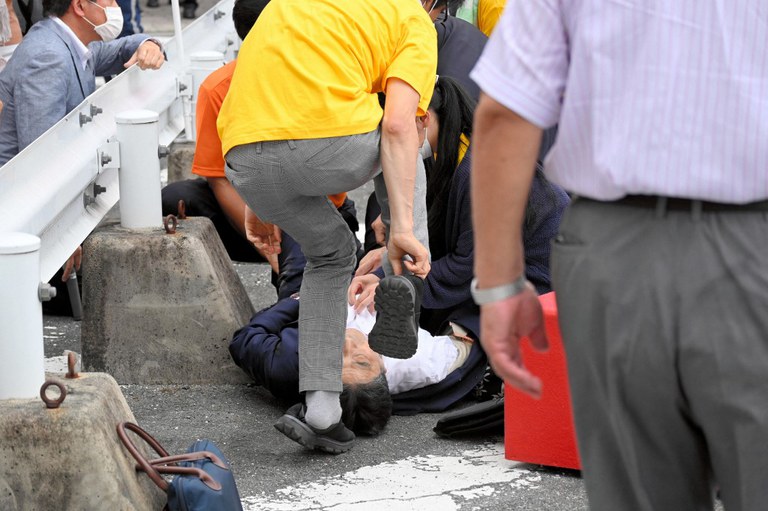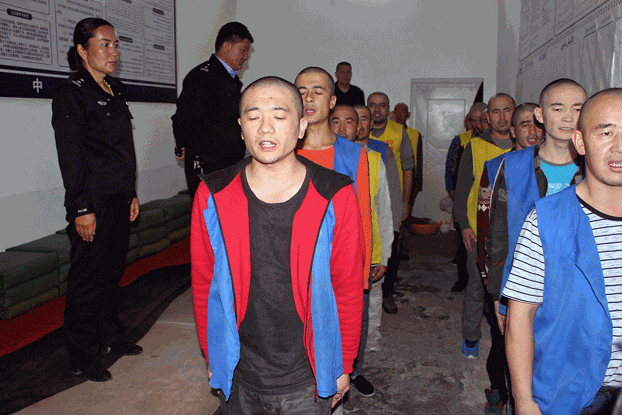Late former prime minister saw the fates of Taiwan, Japan as bound together
Former Japanese Prime Minister Shinzo Abe, who was assassinated on Friday, once remarked: “If Taiwan has a problem, then so do Japan and the United States.” On a democratic island facing the threat of invasion by neighboring China, that warning is quite a legacy. In a post to her Facebook page on Friday, President Tsai Ing-wen eulogized Abe as “Taiwan’s most steadfast friend,” as well as a friend she had known for more than 10 years. “Taiwan and Japan have worked together to overcome many challenges and build deep friendships, and I am grateful for Abe’s support,” Tsai wrote. When Taiwan was still reeling from the 2019 Hualien earthquake, Abe had sent a personal message saying “Go Taiwan!”, Tsai said. He had also played a part in promoting the island’s pineapple exports in the face of an import ban from China, she revealed. The Japanese government had also made a point of shipping COVID-19 vaccines to Taiwan in 2021, at a time when supplies were tight. She said Abe had once more repeated his warning about the interconnectedness of Taiwan’s national interests with those of Japan and the U.S. when they spoke via video call in March 2022. “Taiwan and Japan will continue to support each other and prove to the international community that the axis of good will continue to stand in the face of violence,” Tsai wrote. Tenure as PM Abe was born into a political family in Yamaguchi Prefecture in 1954, becoming prime minister for the first time in 2006, one of the youngest to hold the office, and the first prime minister born after World War II. In 2012, he served again as prime minister again for eight years, resigning due to illness. By then, he was the longest-serving prime minister in Japan and had been in Japanese politics for nearly 30 years. One grandfather was Hiro Abe, a former member of the House of Representatives, while another was prime minister Nobusuke Kishi. His great-uncle was also a prime minister — Eisaku Sato. Japan is no stranger to the assassination of former prime ministers: Inuyo Hamaguchi, Ito Hirobumi, Takahashi Nissin, and others have met with the same fate as Abe. Three days after Abe stepped down as prime minister, he visited the Yasukuni Shrine in Tokyo, where the Class-A war criminals of World War II are enshrined, triggering a backlash from China and South Korea. Abe also urged the revision of the constitution, hoping to revise constitutional limits on Japan’s military. Both Abe and his grandfather, Nobusuke Kishi, successfully bid for the Olympics during their tenure, but neither of them actually presided over the opening of the Olympics their country hosted. After taking office in 2006, Abe chose China instead of the United States for his first foreign trip, which was seen as an “ice-breaker.” Both sides were looking to end the diplomatic deadlock caused by former Prime Minister Junichiro Koizumi’s visit to the Yasukuni Shrine. But Abe stepped down for health reasons after only one year in office. Elected to the House of Representatives in 2009, he led a number of congressmen to visit Taiwan the following year and met with former President Lee Teng-hui, then-President Ma Ying-jeou and then-DPP Chairman Tsai Ing-wen. In 2012, Abe led the Liberal Democratic Party to victory again, but Sino-Japanese relations deteriorated over the Diaoyu/Senkaku Islands and over Abe’s visit to the Yasukuni Shrine. When he eventually visited China in 2018, it was the first time in eight years that a Japanese leader had met with a Chinese leader — in this case, Xi Jinping. Abe invited Xi Jinping to Japan in return, but the pandemic and further deterioration in Sino-Japanese ties meant that trip never happened. Abe also presided over the end of 40 years of Japanese economic aid to China. Pro-Taiwanese leader In Taiwan, Abe is seen as the most pro-Taiwanese prime minister Japan has ever had. Five hours after he was fatally shot, many politicians and members of the public were offering prayers for him via social media. When the news of Abe’s death came, the ruling Democratic Progressive Party, the Kuomintang, the Times Power Party, the People’s Party, and the Fundamental Progress Party all issued statements of condolence. When Abe was at a low ebb, politically, he was encouraged by former Taiwanese President Lee Teng-hui, who gave him some tips to aid his comeback. Lee told Abe that nobody else could be trusted to do the job, and suggested Abe try to revise Japan’s constitution. The two former leaders were like father and son, according to some account. Abe once said: “There is no politician in the world who thinks about Japan like Lee Teng-hui.” Chen Tang-shan, chairman of Taiwan’s Friends of Abe Association, said there had been plans for Abe to visit Taiwan on the second anniversary of Lee’s death at the end of July, but the schedule had yet to be finalized at the time of Abe’s death. “At a time when the international situation is at its most dangerous for Taiwan, we had a good friend who supported Taiwan very strongly,” Chen said. “He sadly lost his life in the shooting. As a political figure in Taiwan, I am very grateful for his support.” “He saw Japan and Taiwan as bound together in the same community,” he said. “We are very sad that someone who saw politics so clearly, and who had the courage to speak out publicly is no longer with us.” Chen Yongfeng, director of the Center for Japanese Regional Studies at Tokai University, said Abe’s stance on Taiwan had become hugely influential in Japanese political circles. Translated and edited by Luisetta Mudie.




